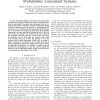Free Online Productivity Tools
i2Speak
i2Symbol
i2OCR
iTex2Img
iWeb2Print
iWeb2Shot
i2Type
iPdf2Split
iPdf2Merge
i2Bopomofo
i2Arabic
i2Style
i2Image
i2PDF
iLatex2Rtf
Sci2ools
117
click to vote
QEST
2010
IEEE
2010
IEEE
Information Hiding in Probabilistic Concurrent Systems
Information hiding is a general concept which refers to the goal of preventing an adversary to infer secret information from the observables. Anonymity and Information Flow are examples of this notion. We study the problem of information hiding in systems characterized by the presence of randomization and concurrency. It is well known that the raising of nondeterminism, due to the possible interleavings and interactions of the parallel components, can cause unintended information leaks. In fact the classic notion of scheduler may depend on the secret choice of one component, hence the adversary can derive the secret from the particular way the observables are ordered in the result of an execution. One way to solve this problem is to fix the strategy of the scheduler beforehand. In this work, we propose a milder restriction on the schedulers, and we define the notion of strong (probabilistic) information hiding under various notions of observables. Furthermore, we propose a method, base...
Related Content
| Added | 14 Feb 2011 |
| Updated | 14 Feb 2011 |
| Type | Journal |
| Year | 2010 |
| Where | QEST |
| Authors | Miguel E. Andrés, Catuscia Palamidessi, Peter van Rossum, Ana Sokolova |
Comments (0)

